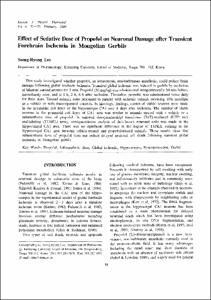Effect of Sedative Dose of Propofol on Neuronal Damage after Transient Forebrain Ischemia in Mongolian Gerbils
- Keimyung Author(s)
- Lee, Seong Ryong
- Department
- Dept. of Pharmacology (약리학)
- Journal Title
- Korean J of Physiology & Pharmacology
- Issued Date
- 2000
- Volume
- 4
- Issue
- 1
- Abstract
- This study investigated whether propofol, an intravenous, non-barbiturate anesthetic, could reduce brain damage following global forebrain ischemia. Transient global ischemia was induced in gerbils by occlusion of bilateral carotid arteries for 3 min. Propofol (50 mg/kg) was administered intraperitoneally 30 min before, immediately after, and at 1 h, 2 h, 6 h after occlusion. Thereafter, propofol was administered twice daily for three days. Treated animals were processed in parallel with ischemic animals receiving 10% intralipid as a vehicle or with sham-operated controls. In histologic findings, counts of viable neurons were made in the pyramidal cell layer of the hippocampal CA1 area 4 days after ischemia. The number of viable neurons in the pyramidal cell layer of CA1 area was similar in animals treated with a vehicle or a subanesthetic dose of propofol. In terminal deoxynucleotidyl transferase (TdT)-mediated dUTP nick end-labeling (TUNEL) assay, semiquantitative analysis of dark-brown neuronal cells was made in the hippocampal CA1 area. There was no significant difference in the degree of TUNEL staining in the hippocampal CA1 area between vehicle-treated and propofol-treated animals. These results show that subanesthetic dose of propofol does not reduce delayed neuronal cell death following transient global ischemia in Mongolian gerbils.
- Keimyung Author(s)(Kor)
- 이성용
- Publisher
- School of Medicine
- Citation
- Seong-Ryong Lee. (2000). Effect of Sedative Dose of Propofol on Neuronal Damage after Transient Forebrain Ischemia in Mongolian Gerbils. Korean J of Physiology & Pharmacology, 4(1), 73–79.
- Type
- Article
- ISSN
- 1226-4512
- Appears in Collections:
- 1. School of Medicine (의과대학) > Dept. of Pharmacology (약리학)
- 파일 목록
-
-
Download
 oak-aaa-4753.pdf
기타 데이터 / 896.1 kB / Adobe PDF
oak-aaa-4753.pdf
기타 데이터 / 896.1 kB / Adobe PDF
-
Items in Repository are protected by copyright, with all rights reserved, unless otherwise indicated.